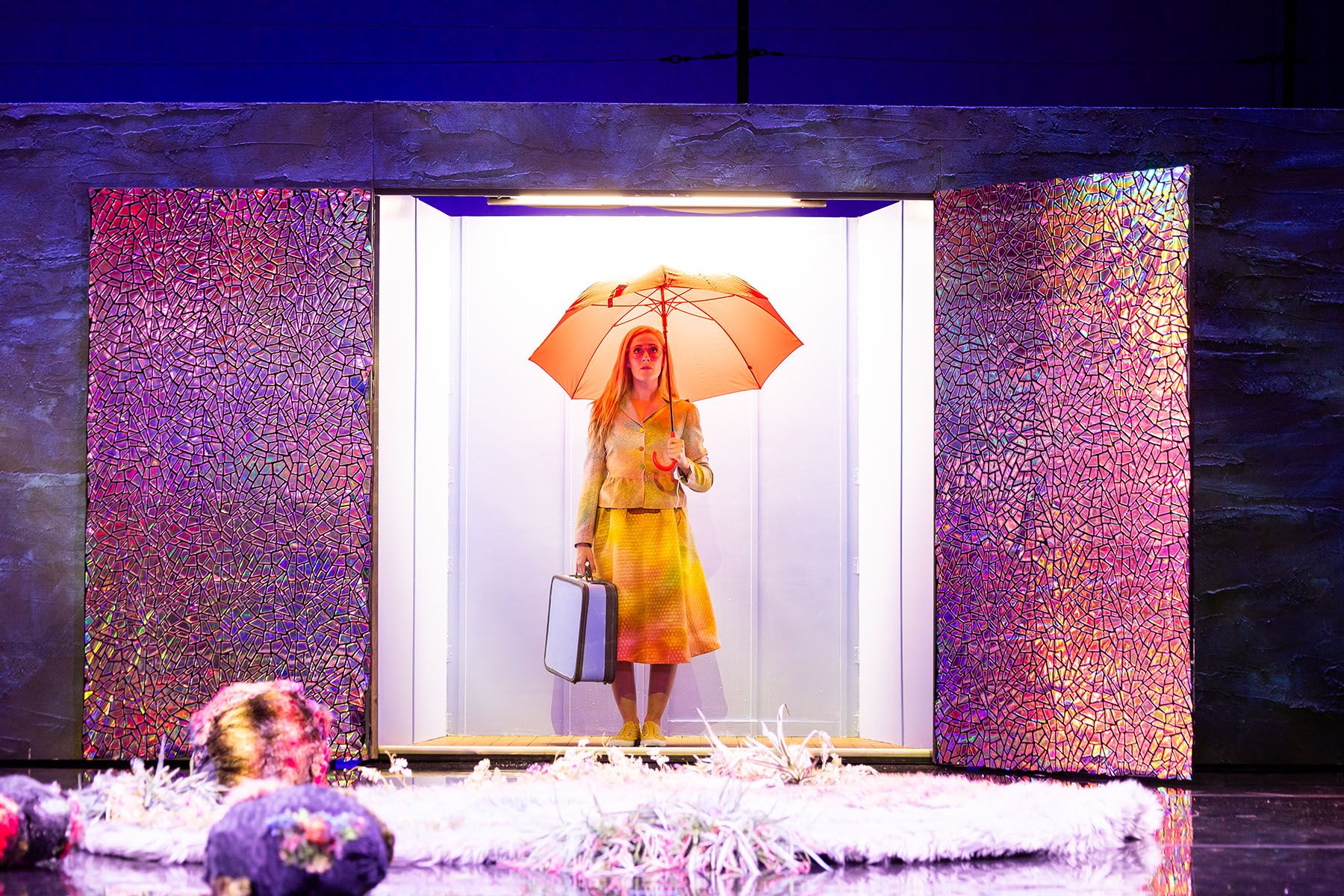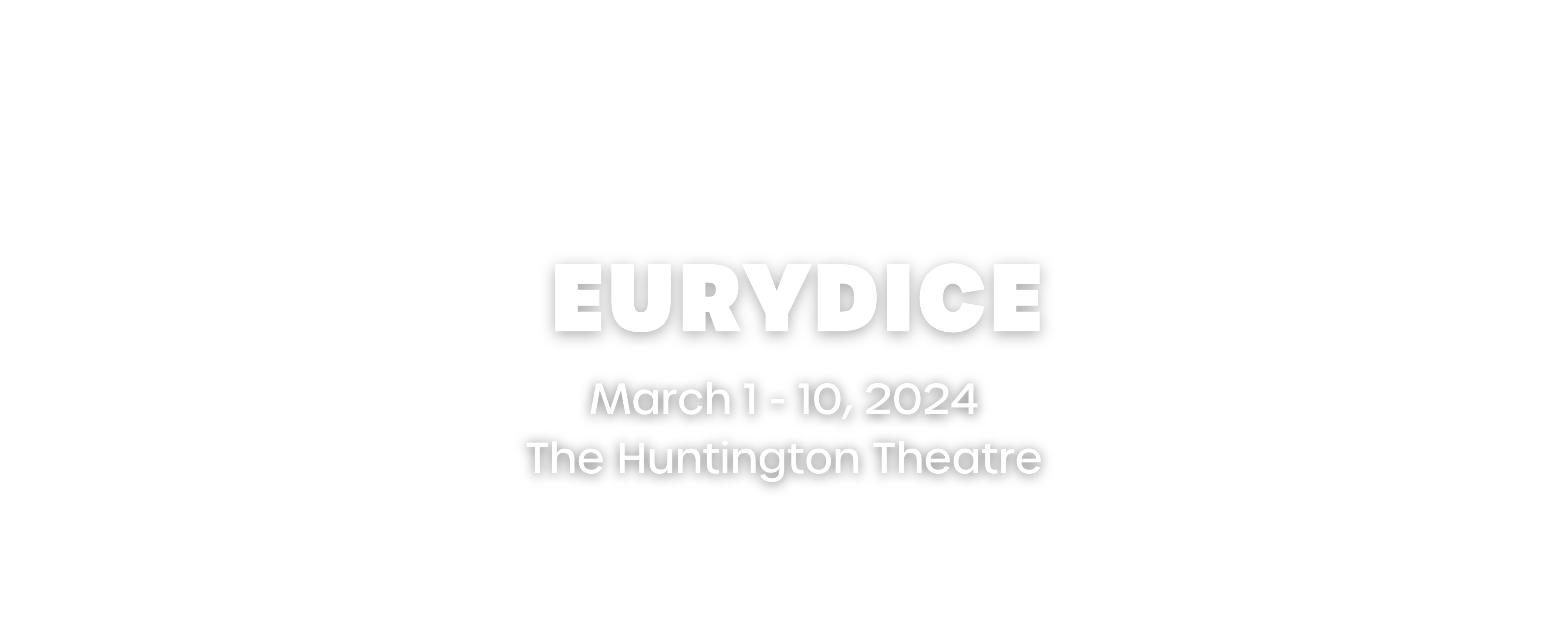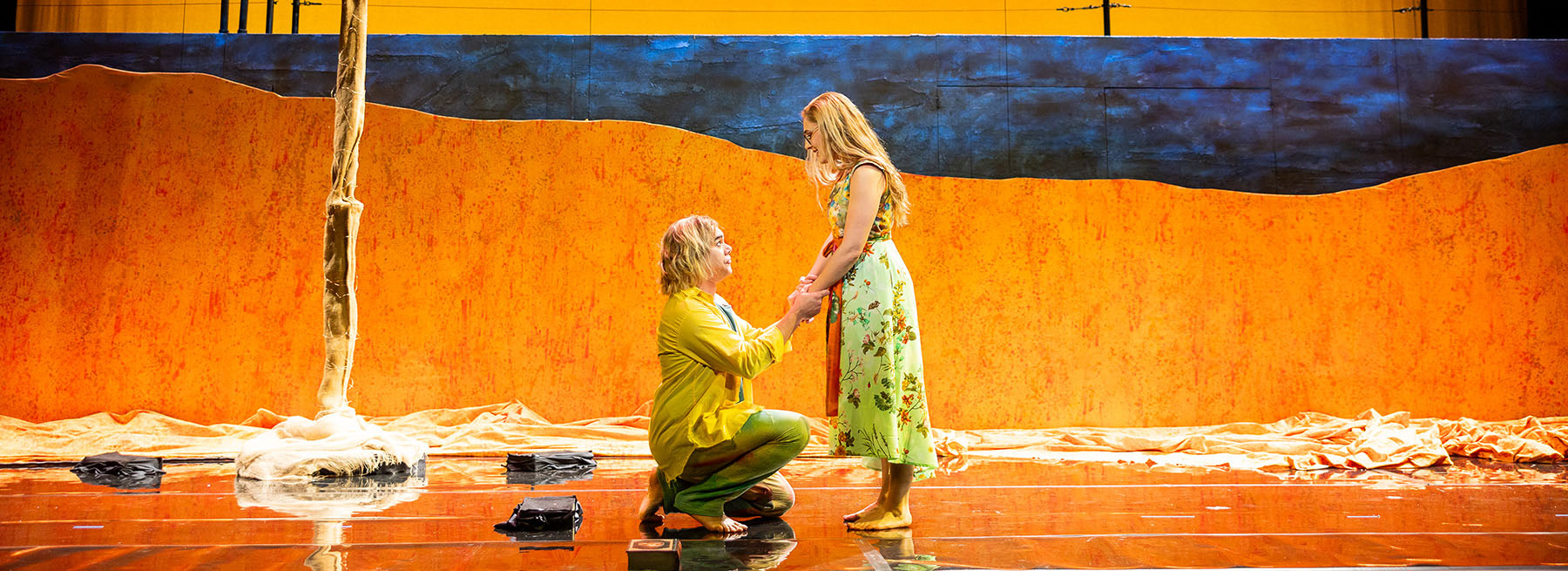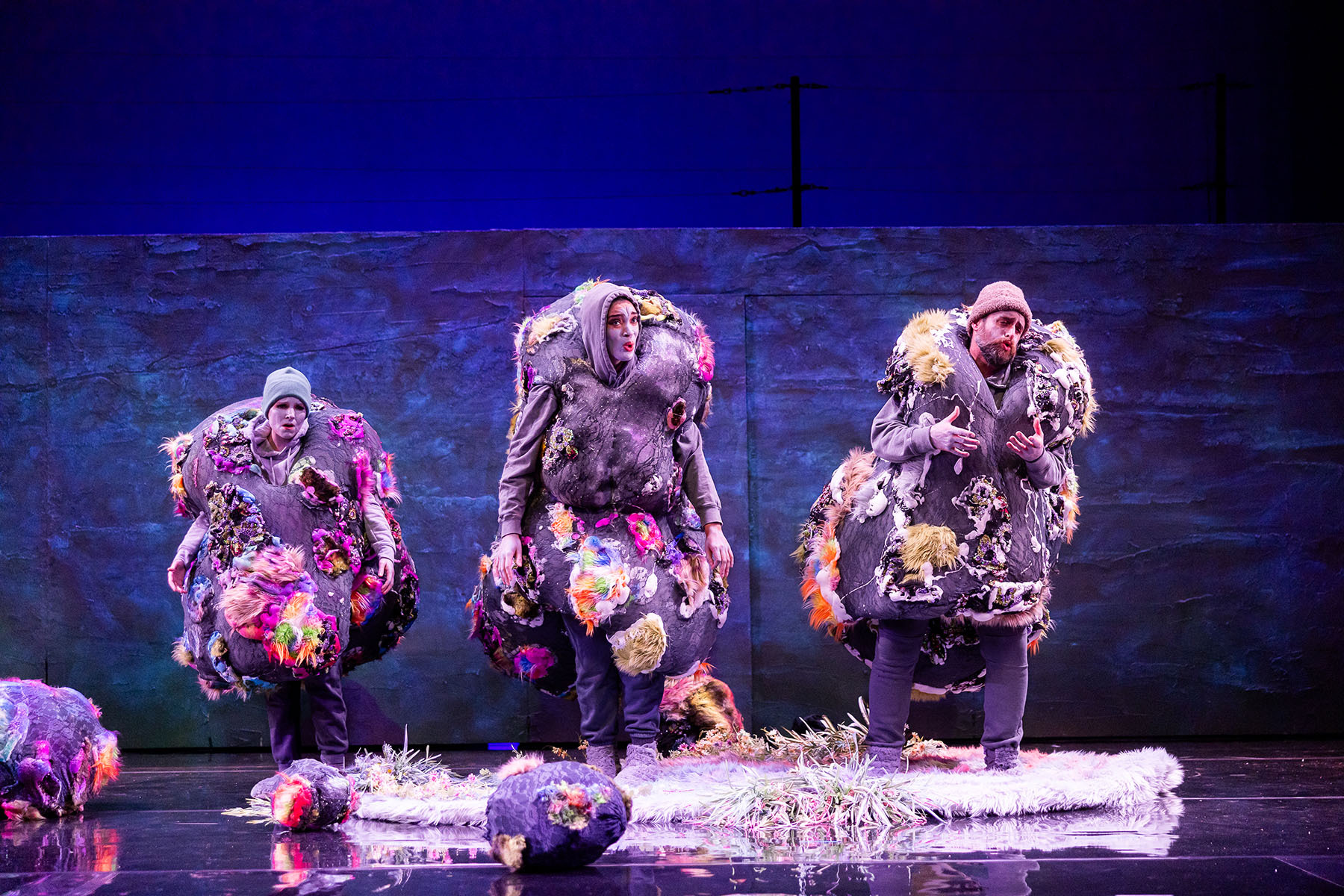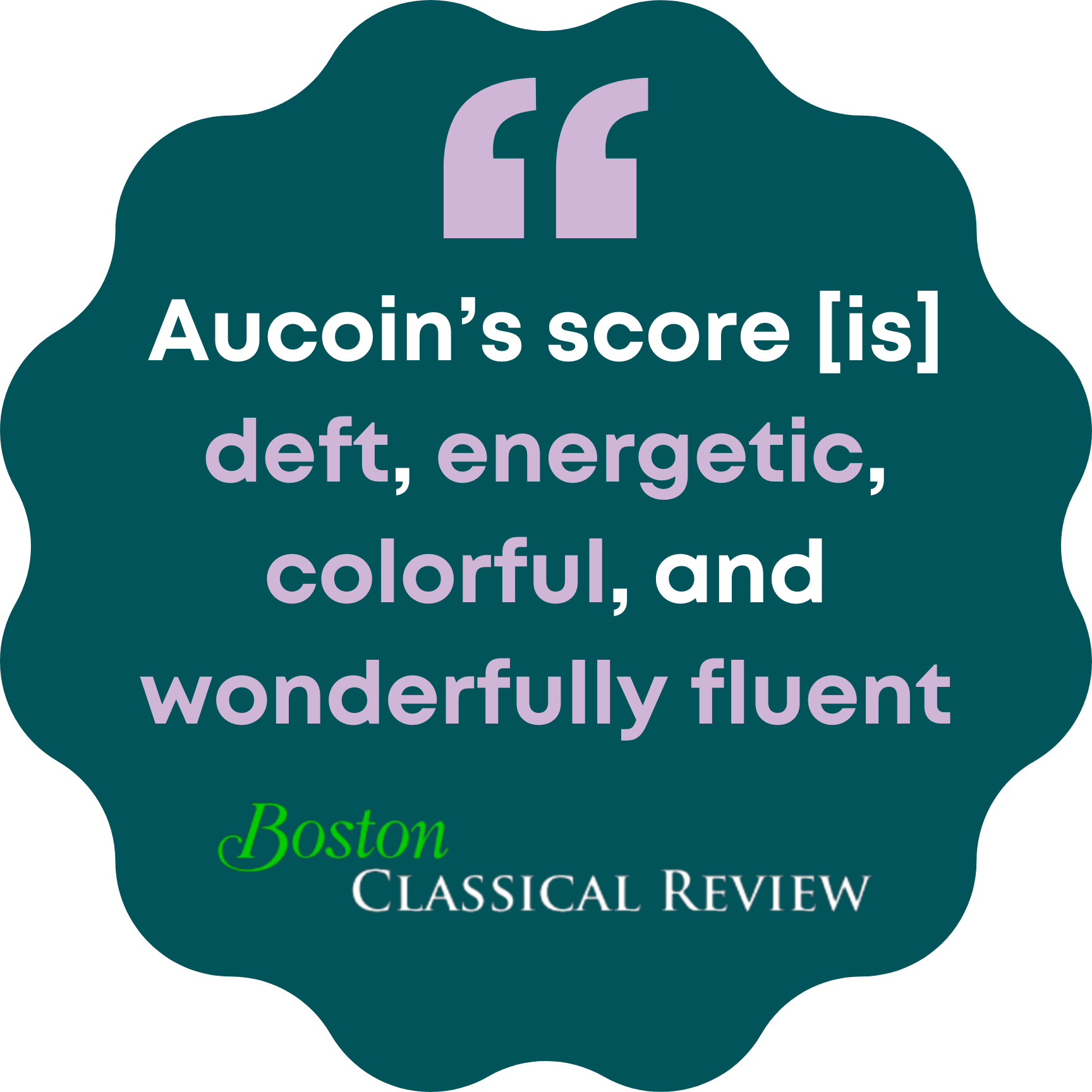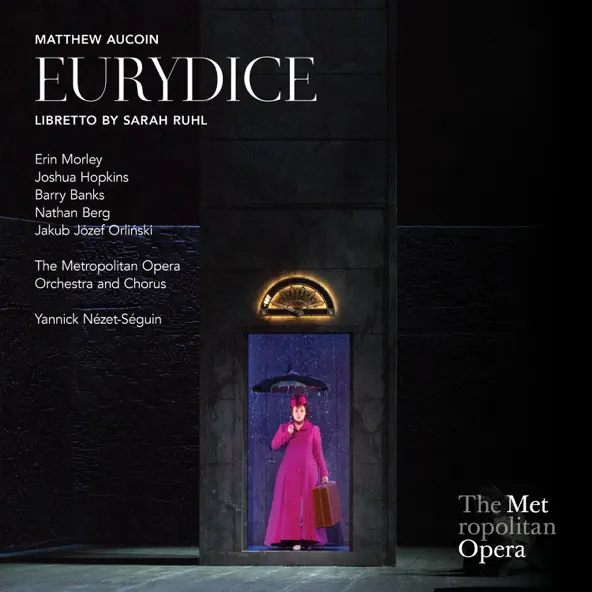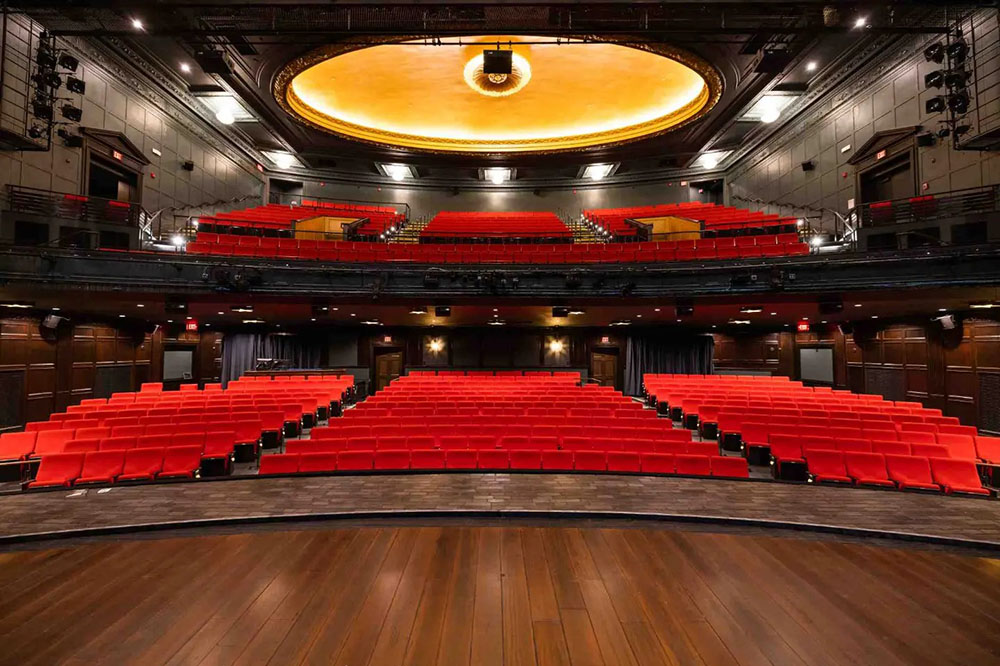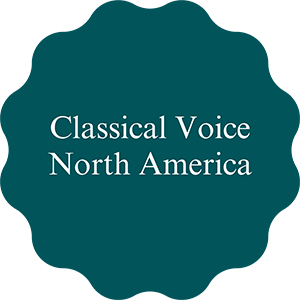Eurydice
Music by Matthew Aucoin
Libretto by Sarah Ruhl
Based on the play by Sarah Ruhl
A new arrangement commissioned by
Boston Lyric Opera and Opera Grand Rapids
Original Orchestration Commissioned by The Metropolitan Opera and Los Angeles Opera. Developed by The Metropolitan Opera/Lincoln Center Theater New Works Program with support from the Opera America Repertory Development Grant.
By arrangement with Associated Music Publishers, Inc./G. Schirmer, Inc.,
Publisher and copyright owner
The Huntington Theatre
Friday, March 1, 2024 | 7:30PM
Sunday, March 3, 2024 | 3PM
Wednesday, March 6, 2024 | 7:30PM
Friday, March 8, 2024 | 7:30PM
Sunday, March 10, 2024 | 3PM
Sung in English dialogue with English surtitles
Running time: 2 hours and 20 minutes, including one 20-minute intermission
In a vivid retelling of the Orpheus myth from his bride’s perspective, composer Matthew Aucoin and librettist Sarah Ruhl’s stunning opera Eurydice follows the titular character as she travels to the underworld on her wedding day. Boston Lyric Opera, together with Opera Grand Rapids, has co-commissioned a new, intimate orchestral arrangement from Aucoin, acclaimed composer and MacArthur Fellow, and Ruhl, Tony and Pulitzer Prize-nominated playwright. This compelling new production, conducted by the composer and directed by Doug Fitch, delves into the profound bonds of family and love – between parents and children, between husband and wife. Eurydice is a resonant story of love’s beauty and brutality – and the power of music to find us in the dark.
The commission of Eurydice is supported in part by a gift from Pat and Bill O’Connor.
Matthew Aucoin’s residency has been made possible by Katie and Paul Buttenwieser.
Interested in more than one opera this Season?
Click HERE to build your perfect package.
Matthew Aucoin | Composer / Conductor
 MATTHEW AUCOIN is an American composer, conductor, and writer, and a 2018 MacArthur Fellow. He is a co-founder of the pathbreaking American Modern Opera Company (AMOC) and was Los Angeles Opera’s Artist in Residence from 2016 to 2020.
MATTHEW AUCOIN is an American composer, conductor, and writer, and a 2018 MacArthur Fellow. He is a co-founder of the pathbreaking American Modern Opera Company (AMOC) and was Los Angeles Opera’s Artist in Residence from 2016 to 2020.
As a composer, Aucoin is committed to expanding the possibilities of opera as a genre. His own operas, which include Eurydice and Crossing, have been produced at the Metropolitan Opera, Los Angeles Opera, the Brooklyn Academy of Music, the Lyric Opera of Chicago, and the Canadian Opera Company, among others. The Metropolitan Opera’s recording of Eurydice was nominated for a Grammy in 2023.
Aucoin’s orchestral and chamber music has been performed by such leading artists and ensembles as Yo-Yo Ma, the Philadelphia Orchestra, Zurich’s Tonhalle Orchestra, the Los Angeles Chamber Orchestra, and the Brentano Quartet.
His recent conducting engagements include appearances with Los Angeles Opera, the Chicago Symphony, the Santa Fe Opera, Houston Grand Opera, the San Diego Symphony, Salzburg’s Mozarteum Orchestra, the Philharmonia Baroque Orchestra, the Rome Opera Orchestra, and many other ensembles.
Aucoin’s book about opera, The Impossible Art: Adventures in Opera, was published in 2021 by Farrar, Straus, & Giroux. He is a regular contributor to leading publications such as The New York Review of Books and The Atlantic.
Douglas Fitch | Stage Director, Set and Costume Designer
 DOUG FITCH is a visual artist best known for his productions of opera and concert theatre. Past projects for the New York Philharmonic include Le Grand Macabre, The Cunning Little Vixen, and A Dancer’s Dream, which combined Stravinsky’s The Fairy’s Kiss with Petrushka, featuring Sarah Mearns dancing through the orchestra as choreographed by Karole Armitage. His production Gloria: A Pig Tale was performed at the Metropolitan Museum for the NY Philharmonic’s inaugural Biennial. This year, Fitch directs the 100th anniversary of NY Philharmonic’s Young People’s Concerts. Career highlights include Turandot, Santa Fe Opera; Hansel and Gretel, LA Opera and Dallas Opera; Punkitititi, Salzburg Marionette Theater; and Peter and the Wolf in Hollywood, LA Philharmonic. He designed sets and costumes for Nashville Ballet’s Black Lucy and the Bard, which appeared on PBS Great Performances, featuring a score by Rhiannon Giddens. His Tanglewood production of What Next? was filmed and screened at The Museum of Modern Art, and his Orphic Moments (merging works by Matthew Aucoin and Gluck) premiered at National Sawdust, later playing at Salzburg’s Landestheater. Additionally, Fitch co-wrote Orphic Fodder with Mimi Oka, ran an art-furniture company called Ooloo, and is an alumnus of the Hermitage residency.
DOUG FITCH is a visual artist best known for his productions of opera and concert theatre. Past projects for the New York Philharmonic include Le Grand Macabre, The Cunning Little Vixen, and A Dancer’s Dream, which combined Stravinsky’s The Fairy’s Kiss with Petrushka, featuring Sarah Mearns dancing through the orchestra as choreographed by Karole Armitage. His production Gloria: A Pig Tale was performed at the Metropolitan Museum for the NY Philharmonic’s inaugural Biennial. This year, Fitch directs the 100th anniversary of NY Philharmonic’s Young People’s Concerts. Career highlights include Turandot, Santa Fe Opera; Hansel and Gretel, LA Opera and Dallas Opera; Punkitititi, Salzburg Marionette Theater; and Peter and the Wolf in Hollywood, LA Philharmonic. He designed sets and costumes for Nashville Ballet’s Black Lucy and the Bard, which appeared on PBS Great Performances, featuring a score by Rhiannon Giddens. His Tanglewood production of What Next? was filmed and screened at The Museum of Modern Art, and his Orphic Moments (merging works by Matthew Aucoin and Gluck) premiered at National Sawdust, later playing at Salzburg’s Landestheater. Additionally, Fitch co-wrote Orphic Fodder with Mimi Oka, ran an art-furniture company called Ooloo, and is an alumnus of the Hermitage residency. Jorge Arroyo | Lighting Designer
 JORGE ARROYO is a freelance lighting designer based in Boston and New York with over 25 years of experience in theatre, dance, concerts, corporate events, opera, and television. Born and raised in Puerto Rico, he is a storyteller who uses light as a medium of communication using both an intellectual and emotional approach to connect with the audience.
JORGE ARROYO is a freelance lighting designer based in Boston and New York with over 25 years of experience in theatre, dance, concerts, corporate events, opera, and television. Born and raised in Puerto Rico, he is a storyteller who uses light as a medium of communication using both an intellectual and emotional approach to connect with the audience.
His work has been seen at venues like The Alley Theatre, The Huntington, The Apollo Theater, Carnegie Hall, The Public Theater, Baltimore Center Stage, The Arden, and Westport Country Playhouse. He previously served as the Resident Lighting Designer for Dreamcatcher Repertory Theater, Calpulli Mexican Dance Company, and Luna Stage. He has created designs for over 50 shows at the New Jersey Performing Arts Center and Jazz at Lincoln Center for artists like Alicia Keys, Gabriel Iglesias, The Chieftains, BeBe & CeCe Winans, Paquito D’Rivera, Phoebe Snow, Stanley Jordan, Kenny Garrett, and Jackie Mason. He has worked with choreographer Stacey Tookey, three-time Emmy nominee, and has co-authored the last three versions of the Lightwright manual and tutorial.
Arroyo is currently an Assistant Professor of Lighting Design, Co-Chair of Design and Production at Boston University, and a member of USA Local 829.
Liz Printz | Wig and Makeup Designer
 LIZ PRINTZ’s credits as a wig designer include: White Rose: The Musical, Theatre Row; Summer Stock, Goodspeed Opera House; The Griswolds’ Broadway Vacation, 5th Avenue Theatre; Bruce, Seattle Rep; Legally Blonde, The Muny; JOY, George Street Playhouse; Company, Barrington Stage; and Annie Get Your Gun, Bay Street Theater. Projects as an associate wig designer on Broadway include: Company, First National Tour; Diana: The Musical; Jersey Boys; Harry Potter and the Cursed Child; Hamilton; On Your Feet; and Beautiful: The Carole King Musical. TV and film credits include The Wiz Live!, hair stylist (Emmy-nominated); the feature film Thorp, producer; and the short films Sun Shine, associate producer; Birdhouse, producer; and Halmoni’s Pot, producer. Ms. Printz is a graduate of the University of North Carolina School of the Arts and a Local 798 Member.
LIZ PRINTZ’s credits as a wig designer include: White Rose: The Musical, Theatre Row; Summer Stock, Goodspeed Opera House; The Griswolds’ Broadway Vacation, 5th Avenue Theatre; Bruce, Seattle Rep; Legally Blonde, The Muny; JOY, George Street Playhouse; Company, Barrington Stage; and Annie Get Your Gun, Bay Street Theater. Projects as an associate wig designer on Broadway include: Company, First National Tour; Diana: The Musical; Jersey Boys; Harry Potter and the Cursed Child; Hamilton; On Your Feet; and Beautiful: The Carole King Musical. TV and film credits include The Wiz Live!, hair stylist (Emmy-nominated); the feature film Thorp, producer; and the short films Sun Shine, associate producer; Birdhouse, producer; and Halmoni’s Pot, producer. Ms. Printz is a graduate of the University of North Carolina School of the Arts and a Local 798 Member.Lauren A. Cook | Intimacy Director
 Lauren A. Cook is a Boston-based stage director, intimacy choreographer, and voice teacher. Her work in intimacy direction and staging includes credits as Assistant Director, A Midsummer Night’s Dream, Commonwealth Shakespeare Company’s Apprentice Repertory Company; Intimacy Director, Book of Will and Burn This, Hub Theatre Company; MassOpera’s immersive La Traviata, two productions of Mary Zimmerman’s Metamorphoses, Suffolk University and Arlington Children’s Theatre; Nighttown (world premiere, winner of the 2023 American Prize in Composition), Lowell House Opera; and a number of educational workshops and lectures. A former faculty member of the Holden Voice Program at Harvard University, she holds a Master of Music in Vocal Pedagogy from the Boston Conservatory at Berklee and continues to teach both actors and singers in voice, speech, and dramatic interpretation. Her writing on consent-based and ethical performing arts education is featured in Trauma and the Voice: A Guide for Singers, Teachers, and Other Practitioners, published by Rowman & Littlefield in 2023. She currently serves as the Education and Artistic Associate for Commonwealth Shakespeare Company.
Lauren A. Cook is a Boston-based stage director, intimacy choreographer, and voice teacher. Her work in intimacy direction and staging includes credits as Assistant Director, A Midsummer Night’s Dream, Commonwealth Shakespeare Company’s Apprentice Repertory Company; Intimacy Director, Book of Will and Burn This, Hub Theatre Company; MassOpera’s immersive La Traviata, two productions of Mary Zimmerman’s Metamorphoses, Suffolk University and Arlington Children’s Theatre; Nighttown (world premiere, winner of the 2023 American Prize in Composition), Lowell House Opera; and a number of educational workshops and lectures. A former faculty member of the Holden Voice Program at Harvard University, she holds a Master of Music in Vocal Pedagogy from the Boston Conservatory at Berklee and continues to teach both actors and singers in voice, speech, and dramatic interpretation. Her writing on consent-based and ethical performing arts education is featured in Trauma and the Voice: A Guide for Singers, Teachers, and Other Practitioners, published by Rowman & Littlefield in 2023. She currently serves as the Education and Artistic Associate for Commonwealth Shakespeare Company.Nile Hawver | Fight Director
 Nile Hawver is an actor, singer, musician, violence designer, and photographer based in Providence, RI. Previous BLO credits include: Romeo and Juliet (fight direction), Greek (actor), and Carmen (supernumerary). Credits as a violence designer include work with Commonwealth Shakespeare Company, Central Square Theater, and Chamber Theatre Company. Acting credits include: Assassins, The Gamm Theatre; Trayf and Man of La Mancha, New Repertory Theatre; Million Dollar Quartet and The Irish and How They Got That Way, Greater Boston Stage Company; Once, Violet, and Mothers and Sons, Speakeasy Stage Company; Breath and Imagination, Lyric Stage Company of Boston; Edward II, Actors’ Shakespeare Project; Ether Dome, Huntington Theatre Company; Twelfth Night, Commonwealth Shakespeare Company; and Twelfth Night, Hamlet, The Recruiting Officer, and Henry V, Montana Shakespeare in the Parks. An upcoming role for Hawver is Guy, Once, The Wilbury Theatre Group.
Nile Hawver is an actor, singer, musician, violence designer, and photographer based in Providence, RI. Previous BLO credits include: Romeo and Juliet (fight direction), Greek (actor), and Carmen (supernumerary). Credits as a violence designer include work with Commonwealth Shakespeare Company, Central Square Theater, and Chamber Theatre Company. Acting credits include: Assassins, The Gamm Theatre; Trayf and Man of La Mancha, New Repertory Theatre; Million Dollar Quartet and The Irish and How They Got That Way, Greater Boston Stage Company; Once, Violet, and Mothers and Sons, Speakeasy Stage Company; Breath and Imagination, Lyric Stage Company of Boston; Edward II, Actors’ Shakespeare Project; Ether Dome, Huntington Theatre Company; Twelfth Night, Commonwealth Shakespeare Company; and Twelfth Night, Hamlet, The Recruiting Officer, and Henry V, Montana Shakespeare in the Parks. An upcoming role for Hawver is Guy, Once, The Wilbury Theatre Group.
Hawver received his MFA in acting from the University of Illinois at Urbana-Champaign and his BFA in acting from the University of Rhode Island, and is a proud member of AEA. When he is not onstage, he’s taking production photos and headshots as Nile Scott Studios.
Sarah Ruhl | Librettist
 SARAH RUHL is an award-winning American playwright, author, essayist, and professor. Her plays include The Oldest Boy; Dear Elizabeth; Stage Kiss; In the Next Room, or the vibrator play (Pulitzer Prize finalist, 2010); The Clean House (Pulitzer Prize finalist, 2005; Susan Smith Blackburn Prize, 2004); Passion Play (Pen American Award, Fourth Freedom Forum Playwriting Award from the Kennedy Center); Dead Man’s Cell Phone (Helen Hayes Award for Best New Play); Melancholy Play; Demeter in the City (nine NAACP Image Award nominations); Scenes From Court Life; How to Transcend a Happy Marriage; For Peter Pan on Her 70th Birthday; Eurydice; Orlando; and Late: a cowboy song. Her plays have been produced on Broadway, across the country, and internationally, and translated into fourteen languages. Originally from Chicago, Ms. Ruhl received her MFA from Brown University, where she studied with Paula Vogel. She is the recipient of a Helen Merrill Emerging Playwrights Award, a Whiting Writers’ Award, a PEN Center Award, a Steinberg Distinguished Playwright Award, and a Lilly Award. She is a member of 13P and New Dramatists and won the MacArthur Fellowship in 2006. She teaches at Yale School of Drama and lives in Brooklyn with her family.
SARAH RUHL is an award-winning American playwright, author, essayist, and professor. Her plays include The Oldest Boy; Dear Elizabeth; Stage Kiss; In the Next Room, or the vibrator play (Pulitzer Prize finalist, 2010); The Clean House (Pulitzer Prize finalist, 2005; Susan Smith Blackburn Prize, 2004); Passion Play (Pen American Award, Fourth Freedom Forum Playwriting Award from the Kennedy Center); Dead Man’s Cell Phone (Helen Hayes Award for Best New Play); Melancholy Play; Demeter in the City (nine NAACP Image Award nominations); Scenes From Court Life; How to Transcend a Happy Marriage; For Peter Pan on Her 70th Birthday; Eurydice; Orlando; and Late: a cowboy song. Her plays have been produced on Broadway, across the country, and internationally, and translated into fourteen languages. Originally from Chicago, Ms. Ruhl received her MFA from Brown University, where she studied with Paula Vogel. She is the recipient of a Helen Merrill Emerging Playwrights Award, a Whiting Writers’ Award, a PEN Center Award, a Steinberg Distinguished Playwright Award, and a Lilly Award. She is a member of 13P and New Dramatists and won the MacArthur Fellowship in 2006. She teaches at Yale School of Drama and lives in Brooklyn with her family.Benjamin Perry Wenzelberg | Assistant Conductor
 In 2023/24, Benjamin Perry Wenzelberg conducts with the Orchestra of the Eighteenth Century, Noord Nederlands Orkest, Bredeweg Festival, and the world premiere of his own cantata with Lyric Fest in Philadelphia. He will assist conductor/composer Matthew Aucoin at Boston Lyric Opera in performances of Aucoin’s Eurydice, also covering one of the vocal roles; and assists at the Atlanta Symphony, Spoleto Festival (Italy)/Orchestra di Santa Cecilia di Roma, and several Dutch orchestras, notably the Rotterdam Philharmonic. Past engagements include performances with the Netherlands Radio Philharmonic, Belgian National, BBC National Orchestra of Wales, and the Dutch National Opera Academy. In 2023, he participated in the Mahler Conducting Competition in Bamberg, subsequently accompanying Barbara Hannigan as part of a concert for Marina Mahler’s 80th birthday. A 2021 Metropolitan Opera National Council District Winner, he has sung with many leading orchestras, including the New York Philharmonic, New York City Opera, and Atlanta Opera. At age 16, Wenzelberg joined the Ink Still Wet programme at Grafenegg, winning first prize and subsequently conducting the Tonkünstler-Orchester. He later won the Leonard Bernstein Memorial Conducting Competition, and in March 2022, conducted the world premiere of his ASCAP Award-winning opera Nighttown at Lowell House Opera. He has also had works performed at the Vienna Musikverein and Carnegie Hall, and by the Rochester Philharmonic and Hyogo Performing Arts Center Orchestra.
In 2023/24, Benjamin Perry Wenzelberg conducts with the Orchestra of the Eighteenth Century, Noord Nederlands Orkest, Bredeweg Festival, and the world premiere of his own cantata with Lyric Fest in Philadelphia. He will assist conductor/composer Matthew Aucoin at Boston Lyric Opera in performances of Aucoin’s Eurydice, also covering one of the vocal roles; and assists at the Atlanta Symphony, Spoleto Festival (Italy)/Orchestra di Santa Cecilia di Roma, and several Dutch orchestras, notably the Rotterdam Philharmonic. Past engagements include performances with the Netherlands Radio Philharmonic, Belgian National, BBC National Orchestra of Wales, and the Dutch National Opera Academy. In 2023, he participated in the Mahler Conducting Competition in Bamberg, subsequently accompanying Barbara Hannigan as part of a concert for Marina Mahler’s 80th birthday. A 2021 Metropolitan Opera National Council District Winner, he has sung with many leading orchestras, including the New York Philharmonic, New York City Opera, and Atlanta Opera. At age 16, Wenzelberg joined the Ink Still Wet programme at Grafenegg, winning first prize and subsequently conducting the Tonkünstler-Orchester. He later won the Leonard Bernstein Memorial Conducting Competition, and in March 2022, conducted the world premiere of his ASCAP Award-winning opera Nighttown at Lowell House Opera. He has also had works performed at the Vienna Musikverein and Carnegie Hall, and by the Rochester Philharmonic and Hyogo Performing Arts Center Orchestra.Sydney Mancasola | Eurydice
 Soprano SYDNEY MANCASOLA began her musical training as a classical violinist in her home state of California and studied voice at the Oberlin Conservatory of Music. She was previously a member of the ensemble at Oper Frankfurt, where her roles included Gilda, Rigoletto; Musetta, La bohème; and Pamina, Die Zauberflöte.
Soprano SYDNEY MANCASOLA began her musical training as a classical violinist in her home state of California and studied voice at the Oberlin Conservatory of Music. She was previously a member of the ensemble at Oper Frankfurt, where her roles included Gilda, Rigoletto; Musetta, La bohème; and Pamina, Die Zauberflöte.
Ms. Mancasola’s notable debuts have included her house debut at the Metropolitan Opera as Pamina in the Julie Taymor production of The Magic Flute; her company and role debut as Adina, L’elisir d’amore, Opéra de Paris; her role and house debut as Melisande, Pelléas et Mélisande, LA Opera; and her debut as Bess in a new production of Breaking the Waves, for the Adelaide Festival and Edinburgh International Festival, where she was awarded a Herald Angel for her performance. She made her European debut with Komische Oper Berlin as the four heroines in Les Contes d’Hoffmann, subsequently returning as Cleopatra, Giulio Cesare; Eurydice, Orpheus in der Unterwelt; and Semele, Semele.
In her 2023/24 season, Sydney returns to the Metropolitan Opera as Frasquita in a new production of Carmen; Des Moines Metro Opera as Mélisande, Pelléas et Mélisande; and makes her company debuts with Teatro Carlo Felice, Genoa, and the Royal Opera House Muscat as Tytania in their co-production of Britten’s A Midsummer Night’s Dream.
Elliot Madore | Orpheus
 Grammy Award-winning baritone ELLIOT MADORE’s 2023/24 season sees his return to Opernhaus Zürich as Oreste, Iphigénie en Tauride; and his role as Anthony Hope, Sweeney Todd, Orchestra La Scintilla. He makes his house debut with Boston Lyric Opera as Orpheus, Eurydice; and with the Accademia Nazionale di Santa Cecilia as the baritone soloist in Buddha Passion. Other concert appearances include Carmina Burana, Baltimore Symphony and Duruflé’s Requiem, Cincinnati Symphony.
Grammy Award-winning baritone ELLIOT MADORE’s 2023/24 season sees his return to Opernhaus Zürich as Oreste, Iphigénie en Tauride; and his role as Anthony Hope, Sweeney Todd, Orchestra La Scintilla. He makes his house debut with Boston Lyric Opera as Orpheus, Eurydice; and with the Accademia Nazionale di Santa Cecilia as the baritone soloist in Buddha Passion. Other concert appearances include Carmina Burana, Baltimore Symphony and Duruflé’s Requiem, Cincinnati Symphony.
Recent highlights include Mercutio, Roméo et Juliette, Figaro, The Barber of Seville, Schaunard, La bohème, Lysander, The Enchanted Island, and Novice Friend, Billy Budd, Metropolitan Opera; Ramón, Girls of the Golden West, Los Angeles Philharmonic; Dr. Falke, Die Fledermaus, Seiji Ozawa Music Academy; Ramiro, L’heure espagnole, Glyndebourne Festival; and Pelléas, Pelléas et Melisande, Bayerische Staatsoper. He has performed internationally with companies including Opera Philadelphia, Tanglewood Festival, Théâtre des Champs-Elysées, San Francisco Opera, Opernhaus Zürich, Santa Fe Opera, Salzburg Festival, Dutch National Opera, Teatro dell’Opera di Roma, Berlin Philharmonic, Houston Symphony Orchestra, Carnegie Hall, and more.
Mr. Madore is a past winner of the Metropolitan Opera National Council Auditions, a recipient of the 2010 George London Award, and a recipient of the ARIAS Emerging Young Artist Award from Opera Canada. He currently serves as an Associate Professor of Voice with the Cincinnati Conservatory of Music.
Mark S. Doss | Father
 MARK S. DOSS Grammy Award winner bass-baritone Mark Steven Doss’s 2023/24 season will bring him to Welsh National Opera as Germont, La traviata. He will appear as Zurga, Les pêcheurs de perles, Opera Ballet Vlaanderen (formerly Vlaamse Opera); and as Eurydice’s Father in Aucoin’s Eurydice with Boston Lyric Opera. La Monnaie will welcome Mr. Doss again as William Daley, The Time of Our Singing.
MARK S. DOSS Grammy Award winner bass-baritone Mark Steven Doss’s 2023/24 season will bring him to Welsh National Opera as Germont, La traviata. He will appear as Zurga, Les pêcheurs de perles, Opera Ballet Vlaanderen (formerly Vlaamse Opera); and as Eurydice’s Father in Aucoin’s Eurydice with Boston Lyric Opera. La Monnaie will welcome Mr. Doss again as William Daley, The Time of Our Singing.
In 2022/23, Mr. Doss participated in OpenAir St. Gallen as William Daley, The Time of Our Singing; and Teatro dell’Opera di Roma as Gorjančikov, From the House of the Dead. He also returned in a concert to Teatro La Fenice.
Mr. Doss’ recent engagements include Balstrode, Peter Grimes, Teatro La Fenice; and Creon, Oedipus Rex, Opera Philadelphia. Other notable performances include concerts of Beethoven’s Symphony No. 9 with Minnesota Orchestra, Opera Highlights concerts with Dallas Opera, Alfio, Cavalleria Rusticana, Royal Opera House; Nicholas, Shell Shock, The Philharmonie de Paris; Daland, Der fliegende Holländer, Dallas Opera; Rigoletto, Rigoletto, Welsh National Opera; Scarpia, Tosca, Welsh National Opera; Crown, Porgy and Bess, Dutch National Opera; and Cadmus, The Bassarids, in concert with the Spanish RTE Orchestra and Kent Nagano.
Nicholas Kelliher | Orpheus Double
 NICHOLAS KELLIHER is an up-and-coming countertenor, originally from Long Island, New York. He most recently portrayed the role of Mago in Louisa Proske’s acclaimed production of Rinaldo at The Glimmerglass Festival, where he was an apprentice artist. Contemporary opera has been the centerpiece of Kelliher’s career. Through the new works division of companies such as the Metropolitan Opera, Cincinnati Opera, and Los Angeles Opera, he has given voice to roles including Elise Traynor in Mazzoli’s Lincoln in the Bardo, Orpheus’s Double in Aucoin’s Eurydice, Jonathan in Spears’s The Righteous, and Man Under the Arch in Puts’s The Hours. He will be covering the same role in The Righteous at Santa Fe Opera in 2024. He was a 2022 Metropolitan Opera Laffont Competition semifinalist, from which he also received the 2023 Education Grant. Kelliher covered Oberon in A Midsummer Night’s Dream with Des Moines Metro Opera as an apprentice artist. He is a student of internationally renowned soprano Carol Vaness.
NICHOLAS KELLIHER is an up-and-coming countertenor, originally from Long Island, New York. He most recently portrayed the role of Mago in Louisa Proske’s acclaimed production of Rinaldo at The Glimmerglass Festival, where he was an apprentice artist. Contemporary opera has been the centerpiece of Kelliher’s career. Through the new works division of companies such as the Metropolitan Opera, Cincinnati Opera, and Los Angeles Opera, he has given voice to roles including Elise Traynor in Mazzoli’s Lincoln in the Bardo, Orpheus’s Double in Aucoin’s Eurydice, Jonathan in Spears’s The Righteous, and Man Under the Arch in Puts’s The Hours. He will be covering the same role in The Righteous at Santa Fe Opera in 2024. He was a 2022 Metropolitan Opera Laffont Competition semifinalist, from which he also received the 2023 Education Grant. Kelliher covered Oberon in A Midsummer Night’s Dream with Des Moines Metro Opera as an apprentice artist. He is a student of internationally renowned soprano Carol Vaness.David Portillo | Hades
 DAVID PORTILLO American tenor David Portillo has established himself as a leading classical singer of his generation. 2022/23 projects included Tamino, The Magic Flute, Metropolitan Opera; Ferrando, Così fan tutte, Dallas Opera; Nadir, The Pearl Fishers, Austin Opera; Tonio, La fille du régiment, Minnesota Opera; Henry, Die schweigsame Frau, Bard Festival; and Don Ottavio, Don Giovanni in Osaka, Japan. He performed Britten’s Serenade for Tenor, Horn and Strings with the St. Paul Chamber Orchestra; Jephtha, Jephtha, Music of the Baroque; and sang for Source Song Festival in Minneapolis. Highlights of his 2023/24 season include a world tour as Jacquino, Fidelio, LA Philharmonic, with Gustavo Dudamel; Pirro, Ermione, Washington Concert Opera; and lead roles with Santa Fe Opera, Calgary Opera, and more.
DAVID PORTILLO American tenor David Portillo has established himself as a leading classical singer of his generation. 2022/23 projects included Tamino, The Magic Flute, Metropolitan Opera; Ferrando, Così fan tutte, Dallas Opera; Nadir, The Pearl Fishers, Austin Opera; Tonio, La fille du régiment, Minnesota Opera; Henry, Die schweigsame Frau, Bard Festival; and Don Ottavio, Don Giovanni in Osaka, Japan. He performed Britten’s Serenade for Tenor, Horn and Strings with the St. Paul Chamber Orchestra; Jephtha, Jephtha, Music of the Baroque; and sang for Source Song Festival in Minneapolis. Highlights of his 2023/24 season include a world tour as Jacquino, Fidelio, LA Philharmonic, with Gustavo Dudamel; Pirro, Ermione, Washington Concert Opera; and lead roles with Santa Fe Opera, Calgary Opera, and more.
Career highlights include performances at The Metropolitan Opera as Steuermann, Der fliegende Holländer; Chevalier de la Force, Dialogues des Carmélites; and Eduardo, The Exterminating Angel; at Lyric Opera of Chicago as Arbace, Idomeneo and David, Die Meistersinger von Nürnberg; and Houston Grand Opera as Tamino, Die Zauberflöte and Count Almaviva, Il barbiere di Siviglia. Mr. Portillo is an alumnus of the Ryan Opera Center (Lyric Opera of Chicago), the Merola Opera Program (San Francisco Opera), and Wolf Trap Opera.
Maggie Finnegan | Little Stone / Ensemble
 MAGGIE FINNEGAN’s versatile repertoire spans periods from medieval to contemporary music. Overseas she has debuted with the Belgian National Orchestra, the Andriessen Festival in the Netherlands; and the PyeongChang Winter Music Festival in South Korea. A proponent of both legacy and contemporary works, Ms. Finnegan has performed extensively throughout the United States with numerous companies: Boston Lyric Opera, Opera Parallèle, Portland Bach Experience, National Sawdust, Boston Baroque, Handel and Haydn Society, Center for Contemporary Opera, Boston Modern Opera Project, American Chamber Opera Company, Capital Fringe Chamber Music Series, Avanti Orchestra, and Beth Morrison Projects.
MAGGIE FINNEGAN’s versatile repertoire spans periods from medieval to contemporary music. Overseas she has debuted with the Belgian National Orchestra, the Andriessen Festival in the Netherlands; and the PyeongChang Winter Music Festival in South Korea. A proponent of both legacy and contemporary works, Ms. Finnegan has performed extensively throughout the United States with numerous companies: Boston Lyric Opera, Opera Parallèle, Portland Bach Experience, National Sawdust, Boston Baroque, Handel and Haydn Society, Center for Contemporary Opera, Boston Modern Opera Project, American Chamber Opera Company, Capital Fringe Chamber Music Series, Avanti Orchestra, and Beth Morrison Projects.
Recent engagements include performing Schoenberg songs with Brooklyn Art Song Society, appearing as a guest recitalist with Vanderbilt University, VALIS with the MIT Media Lab, Marc Hoffeditz’s opera U-Hauling, Boston Lyric Opera and Opera Philadelphia’s presentation of Svadba by Canadian composer Ana Sokolović, and the title role in Sophia’s Forest by Lembit Beecher at Opera Parallèle with Nicole Paiement conducting.
As a recording artist, she can be heard on recordings of X: The Life and Times of Malcolm X by Anthony Davis; The Wake World by David Hertzberg; and Everything for Dawn with Experiments in Opera.
Alexis Peart | Big Stone / Ensemble
 ALEXIS PEART In the 2023/24 season, Alexis Peart joins Boston Lyric Opera as an Emerging Artist, making her company debut as Tisbe, La Cenerentola; Big Stone, Eurydice; and Dorothée (cover), L’Amant Anonyme. She is featured as the Vocal Quartet Mezzo-Soprano in Jorge Sosa’s Monkey with White Snake Projects and as the mezzo in a world premiere by Kitty Brazelton to accompany FirstWorks (RI)’s bespoke public art experience with Masary Studios.
ALEXIS PEART In the 2023/24 season, Alexis Peart joins Boston Lyric Opera as an Emerging Artist, making her company debut as Tisbe, La Cenerentola; Big Stone, Eurydice; and Dorothée (cover), L’Amant Anonyme. She is featured as the Vocal Quartet Mezzo-Soprano in Jorge Sosa’s Monkey with White Snake Projects and as the mezzo in a world premiere by Kitty Brazelton to accompany FirstWorks (RI)’s bespoke public art experience with Masary Studios.
In 2022/23, Ms. Peart performed as the Voice of Israel, The Ordering of Moses, Rochester Oratorio Society; the mezzo soloist in Mahler’s Symphony No. 2, Boston University Philharmonic Orchestra; and Carmen (cover) in La Tragédie de Carmen, Chautauqua Opera. She appeared frequently with the Boston University Opera Institute, most recently as Jo, Little Women; Ruggiero, Alcina; and Brittomara, If I Were You. Ms. Peart is a two-time alumna of the Wolf Trap Opera Studio (2020/2021) and 2022 winner of the Boston University Carnegie Hall competition.
Ms. Peart debuted as Ada Lovelace, The Thrilling Adventures of Lovelace and Babbage (world premiere), Guerrilla Opera and presented the first live performance of Love in the Time Of, a song cycle commissioned by Boston Opera Collaborative. She can be heard on the Grammy-nominated recording of X: The Life and Times of Malcolm X, Boston Modern Orchestra Project and Odyssey Opera; and on several art song recordings released by PARMA Recordings, LLC.
Neal Ferreira | Loud Stone / Ensemble
 NEAL FERREIRA is a nationally recognized lyric tenor known for his cultivated vocalism and eloquent expression. He recently appeared as Tamino, The Magic Flute, Boston Youth Symphony Orchestra and and Macheath, The Beggar’s Opera, Emmanuel Music. He made his Carnegie Hall debut in the spring of 2022 with the Boston Symphony Orchestra as Ein Soldat in Wozzeck under the baton of Maestro Andris Nelsons.
NEAL FERREIRA is a nationally recognized lyric tenor known for his cultivated vocalism and eloquent expression. He recently appeared as Tamino, The Magic Flute, Boston Youth Symphony Orchestra and and Macheath, The Beggar’s Opera, Emmanuel Music. He made his Carnegie Hall debut in the spring of 2022 with the Boston Symphony Orchestra as Ein Soldat in Wozzeck under the baton of Maestro Andris Nelsons.
A sought-after interpreter of new music, Ferreira made his European debut in the spring of 2021 as Laertes, Hamlet (world premiere), State Opera Rousse, Bulgaria. Other notable performances include the Visitor, In the Penal Colony, Boston Lyric Opera. He has also been featured on the premiere recordings of Charles Wuorinen’s Haroun and the Sea of Stories, BMOP/sound; Joseph Summer’s The Tempest, Albany; Mario Castelnuovo-Tedesco’s The Importance of Being Earnest, Odyssey Opera; and James MacMillan’s Clemency, BIS Records.
Ferreira has also appeared with Florida Grand Opera, the Glimmerglass Festival, Opera Colorado, Virginia Opera, Anchorage Opera, Syracuse Opera, American Repertory Theatre, Boston Modern Orchestra Project, and Guerilla Opera. He is a proud student of internationally renowned tenor Frank Lopardo.
Junhan Choi | Ensemble
 JUNHAN CHOI Baritone Junhan Choi, a native of South Korea, is an active opera, oratorio, and concert singer. His 2023/24 season engagements include Registrar & Commissioner, Madama Butterfly; Dandini(cover), La Cenerentola; and Fourth Stone, Eurydice with Boston Lyric Opera as part of his second year as a Jane and Steven Akin Emerging Artist. Mr. Choi has been a prize winner in many international competitions, such as the 54th Viñas International Voice Competition (Spain/Three Extraordinary Prizes – Mercedes Viñas, Victoria de los Ángeles, Franz Schubert), the Berliner International Music Competition (Germany/Golden Medal), Talents of the World International Voice Competition (First Place), MassOpera’s Vocal Competition (First Place), Rochester International Vocal Competition, and the St. Botolph Emerging Artist Grant for excellence in music. He holds a Master’s degree and a Graduate Diploma with a Presidential Scholarship from New England Conservatory of Music.
JUNHAN CHOI Baritone Junhan Choi, a native of South Korea, is an active opera, oratorio, and concert singer. His 2023/24 season engagements include Registrar & Commissioner, Madama Butterfly; Dandini(cover), La Cenerentola; and Fourth Stone, Eurydice with Boston Lyric Opera as part of his second year as a Jane and Steven Akin Emerging Artist. Mr. Choi has been a prize winner in many international competitions, such as the 54th Viñas International Voice Competition (Spain/Three Extraordinary Prizes – Mercedes Viñas, Victoria de los Ángeles, Franz Schubert), the Berliner International Music Competition (Germany/Golden Medal), Talents of the World International Voice Competition (First Place), MassOpera’s Vocal Competition (First Place), Rochester International Vocal Competition, and the St. Botolph Emerging Artist Grant for excellence in music. He holds a Master’s degree and a Graduate Diploma with a Presidential Scholarship from New England Conservatory of Music.Junhan Choi | Ensemble

Ms. Savage’s recent seasons included roles as New Ofglen in Boston Lyric Opera’s highly acclaimed production of The Handmaid’s Tale, Nada, Svadba, BLO/Opera Philadelphia; and Bice, Pia de’ Tolomei, Spoleto Festival USA. She also sang Salieri’s Requiem, Commonwealth Chorale; Bernstein’s Jeremiah Symphony and Arias and Barcarolles, Glens Falls Symphony Orchestra; and a sold-out performance of the Verdi Requiem with the Metropolitan Chorale in Boston’s Jordan Hall. Ms. Savage has performed with numerous opera companies, festivals, and orchestras across the United States, including Opera Saratoga, Florentine Opera, Spoleto Festival USA, Opera on the James, and at Seiji Ozawa Hall at the Tanglewood Institute. Recent engagements include performances with White Snake Projects, Boston Lyric Opera, and American Lyric Theater. She is featured on the albums Music to Hear and Who is Sylvia by The Shakespeare Projects.
Vera Savage will be performing the role of Big Stone/Ensemble for March 8 & 10 performances.
Act One
We meet two lovers, Orpheus and Eurydice, on a beach. They’re young and helplessly, deeply in love. However, Eurydice is frustrated that Orpheus’s mind always seems to be elsewhere: he hears music in his head, represented by a spirit double or Daemon, invisible to Eurydice. Orpheus proposes by playfully tying string around Eurydice’s ring finger. She says yes.
In the Underworld, Eurydice’s father—who has recently died—writes her a letter, offering fatherly advice for her wedding day. He laments that he doesn’t know how to get his letters to her.
At their wedding, Orpheus and Eurydice dance. Eurydice finds the party overwhelming. She says she’s feeling warm, and steps outside to find a drink of water. Alone outside, Eurydice realizes how much she misses her father. At that moment, a mysterious man appears, claiming that he has a letter from her father, but that she must follow him to his penthouse apartment to retrieve it.
At his apartment, the man gives Eurydice champagne and puts on terrible mood music. He does not give her the letter. Eurydice realizes she’s made a terrible mistake and turns to leave. The man reveals the letter. Eurydice recognizes her father’s handwriting. She tries to grab the letter and run away, but she trips. She falls down hundreds of stairs, into the Underworld, to her death.
Act Two
In the Underworld, we meet three Stones (Little Stone, Big Stone, and Loud Stone), obnoxious bureaucratic guardians of the land of the dead, who serve as a kind of Greek chorus. They explain that Eurydice has died, and that, as a dead person, she will lose her memory and the power of language.
Eurydice arrives in the Underworld in a raining elevator. When she is doused with the waters of this alternate Lethe, she loses her memory. When she steps out of the elevator, her father greets her. Eurydice has no idea who he is. Her father tries to make her comfortable.
In the world above, Orpheus mourns Eurydice’s death. He writes her a letter, but does not know how to get it to her.
In the Underworld, the Father builds a room out of string for Eurydice. A letter falls from the sky. The Father reads it and tells Eurydice it is from Orpheus. The name “Orpheus” triggers something in Eurydice, and she begins to remember who she is. She finally recognizes her father.
Orpheus slowly lowers the collected works of Shakespeare into the underworld on a string. The Father reads to Eurydice from King Lear. Eurydice begins to learn language again, word by word.
Orpheus resolves to find a way to get to the Underworld and bring Eurydice back.
In the Underworld, the Stones hear Orpheus singing wordlessly as he approaches the gates. Distressed, the Stones call their boss, Hades. When he appears, it is revealed that he was also the man who lured Eurydice to her death.
Intermission
Act Three
Orpheus and his Daemon sing at the gates of the Underworld, pleading to be let in. Hades appears and dismissively informs him of the rules for bringing Eurydice back to the world above. She can follow him, but he must not look back to make sure she is there.
Eurydice is torn between following Orpheus and staying with her father. Her father insists that she follow Orpheus and live out her life in the world above.
When she sees Orpheus up ahead, Eurydice is afraid, not convinced that it’s really him. She follows, but eventually rushes toward him and calls his name. Orpheus turns around, startled. The lovers are slowly, helplessly pulled apart.
The Father is desolate that Eurydice is gone. In despair, he decides to dip himself in the river of forgetfulness and obliterate his memory. He quietly speaks the directions to his childhood home and lowers himself into the water.
Eurydice returns to the Underworld and finds, to her horror, that her father has dipped himself in the river. Hades reappears to claim her as his bride. She asks for a moment to prepare herself.
She finds a pen in her father’s coat pocket and writes a letter to Orpheus, with instructions for his future wife on how to take care of him. She dips herself in the river of forgetfulness.
The elevator descends once again. In it is Orpheus. He sees Eurydice lying on the ground. He recognizes her and is happy. But the elevator rains on Orpheus, obliterating his memory. He steps out of the elevator. He finds the letter Eurydice wrote to him. He does not know how to read it, and his music has deserted him. We end in silence.
The Huntington Theatre
264 Huntington Avenue | Boston, MA | 02115
“BLO’s performance was excellent, as was its production [with] impressive moments [both] visual and musical! The production design was superb.”
– The Boston Globe
March 3, 2024
“Touching…Aucoin’s score [is] deft, energetic, colorful, and wonderfully fluent…with fresh instrumentation vividly dispatched by the BLO orchestra.”
– Boston Classical Review
March 2, 2024
Upcoming BLO Events
Street Stage @ Charlestown Navy Yard
August 3 @ 3:30 pm - 5:30 pm EDT
Street Stage @ Moakley Park Summer Nights
August 7 @ 5:30 pm - 7:30 pm EDT
Opera Creation Boot Camp, A Professional Development Intensive for Educators
August 12 @ 9:00 am - 4:00 pm EDT
Opera Creation Boot Camp, A Professional Development Intensive for Educators
August 13 @ 9:00 am - 4:00 pm EDT
“All I have, I give for love” comes from Sarah Ruhl’s libretto for Eurydice, the opera composed by Matthew Aucoin, a chamber orchestra version co-commission appearing in Boston Lyric Opera’s 2023-24 Season.
Originally commissioned by The Metropolitan Opera and Los Angeles Opera. This chamber orchestra version commissioned by Boston Lyric Opera and Opera Grand Rapids.

